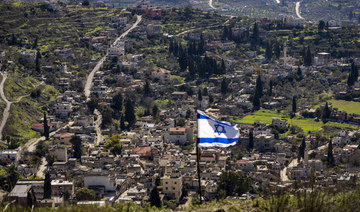LONDON: A damning new report by Amnesty International has branded Israel an apartheid regime, accusing the country of committing crimes against humanity.
And the organization has called for a full investigation into Israeli actions by the International Criminal Court in The Hague, Netherlands.
The report, released on Tuesday, said: “Israeli authorities must be held accountable.
“Massive seizures of Palestinian land and property, unlawful killings, forcible transfer, drastic movement restrictions, and the denial of nationality and citizenship to Palestinians are all components of a system which amounts to apartheid under international law.”
Human Rights Watch has also accused Israel of being an apartheid regime.
Amnesty International said: “This system is maintained by violations which Amnesty International found to constitute apartheid as a crime against humanity, as defined in the Rome Statute and Apartheid Convention.”
Apartheid has been defined as, “an institutionalized regime of oppression and domination by one racial group over another.” Amnesty International highlighted a host of actions and systems put in place by Israel that amounted to apartheid.
Within that system, it pointed out that Palestinians in the occupied territories and those with Israeli citizenship were treated as a “demographic threat,” adding that the Israeli regime had “pursued a policy of establishing and then maintaining a Jewish demographic majority and maximizing control over land and resources to benefit Jewish Israelis.”
Widespread and systemic dispossession of land was also noted as a key indicator that Palestinians were living under an apartheid regime.
“Since its establishment, the Israeli state has enforced massive and cruel land seizures against Palestinians and continues to implement myriad laws and policies to force Palestinians into small enclaves,” Amnesty International said.
“Since 1948, Israel has demolished hundreds of thousands of Palestinian homes and other properties across all areas under its jurisdiction and effective control.”
It added that “Draconian” movement restrictions placed on Palestinians also contributed to the labeling of Israel as an apartheid state and said that a web of military checkpoints, roadblocks, fences, and other structures controlled the movement of Palestinians within the occupied territories and restricted their travel into Israel or abroad.
Israel rejected the report ahead of its publication, branding it “antisemitic.”
A statement released on Monday by the Israeli Embassy in London, said: “Amnesty International’s report is a shameful misrepresentation of Israel’s diverse and dynamic society. As a proud democracy, we looked for nuance but found only falsehood and distortion.
“This antisemitic report recycles lies instead of seeking truth and consolidates bad-faith attacks from those who seek to demonize the state of Israel.
“Our citizens can speak from lived experience about the challenges we face as we try to create a better society, the goal of every democracy. We need to amplify these voices. We should center people who passionately and openly reflect the complexity and nuance of Israeli society, as opposed to focusing on erroneous and damaging reports that attempt to delegitimize Israel.
“It’s a sad truth that if Israel were not a Jewish state, Amnesty would not employ such vicious smears against us,” the statement added.



























